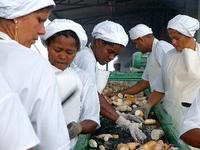Cooperatives supported by the Odebrecht Foundation generate work and income in rural areas
More than 840 farmers and farming families are part of these institutions
17 de June de 2015
More than 840 farmers and farming families are part of these institutions
17 de June de 2015

According to the Food and Agriculture Organization of the United Nations (FAO), the increase in world population – which by 2050 is expected to reach 9 billion – imposes on global leaders the challenge of increasing farming in a sustainable manner. To answer this demand, global food production must increase 70%.
The active food production is directly related to the role of the agricultural worker. In Bahia, an innovative experience contributes to this scenario. The Development and Integrated Growth Program with Sustainability (PDCIS) coordinated by the Odebrecht Foundation and supported by its public and private partners, promotes education, generation of work and income with citizenship and respect for the environment. The work is concentrated in the Southern Bahia Lowlands Environmental Protection Area Mosaic.
The PDCIS seeks to build opportunities for young people and their families to develop themselves and their communities in the above-mentioned region, which includes 11 municipalities whose economic strength is grounded in agriculture. One of the chosen manners for achieving the desired result is through the Strategic Cooperative, which aggregates farmers and farming families responsible for the cultivation of tons of food per year, amongst those can be listed pineapple, banana, sweet cassava, cassava, fish and heart –of-palm. These cultures are mainly distributed in the Northeastern and Southeastern regions of Brazil.
The cooperatives, which take part in the Odebrecht Foundation Governance Pact through PDCIS, are strategic because they master the entire productive chain: rural production, processing and marketing. They were established fully grounded on the economic vocation of a particular area, and strive for achieving new standards of quality and promoting social inclusion.
The farming families access technologies that enable them to increase their productivity and add economic and social values to their products. They also find support in marketing through specialized partnerships.
Thus the farming families have access to technology and consequently a higher rate of income return with the cultivation of cassava (for flour production), fruits and vegetables, hearts-of-palm (for canned palm) and fish farming (for fish fillet production). 840 families are associated in three cooperatives:
• Southern Bahia Lowland Hearts-of-Palm Producers Cooperative – Coopalm:
Established in 2004, Coopalm guides technically and financially the farming families who cultivate heart-of-palm. The stalks delivered to the cooperative are processed and made into the preserved heart-of-palm jar. The process has been certified with ISO 9001 (Quality Management), ISO 14001 (Environmental Management), FSSC 22000 (food safety), and the Farming Family seal (federal and state) and Superior Taste Awards seal. In 2014, its members collected more than 5.2 million stalks and amassed a turnover of R$25 million.
• Presidente Tancredo Neves Rural Producer’s Cooperative – Coopatan:
Founded in the year 2000, Coopatan provides income and quality of life for Family-Units, in addition to offering quality products to its social partners and customers. Through the cooperative, its associated members sell banana, sweet cassava and pineapple, cassava flour and puba and sweet cassava paste.
In 2014, 3,300 tons of cassava, 2,000 tons of plantain, 600 tons of sweet cassava and 360 thousand pineapple plants were cultivated. The Cooperative recorded a turnover of more than R$ 10.5 million.
• Continental Waters Fish Farmers’ Cooperative – Coopecon:
A direct result of the Social mobilization of fish farmers and families from the countryside, Coopecon supports its cooperative’s associates with technical assistance while processing and marketing the fish produced by them. They are responsible for St. Peters fish production chain since 2010. The Cooperative associates rely on a a Fish Processing Unit certified by the Ministry of Agriculture, Livestock and Supply, Federal Inspection Service, which enables the production of by-products, expanding thus their income. In 2014, more than 880 tons of fish were processed and sold, generating a turnover of more than R$ 9.5 million.
About the Odebrecht Foundation
The Odebrecht Foundation, a private, nonprofit institution, established by the Odebrecht Group, turns 50 in 2015. Since its inception, the Odebrecht Foundation focus on contributing to the formation of a structured population in family units, responsible for their own sustainable development. Its mission is to educate for life, through work, for values and the overcoming limits.
The Foundation focuses its efforts on the development of adolescents and their families, based on their abilities and needs, in order to create solutions in conjunction with local communities. The essence of the chosen actions is based on the principles, concepts and criteria of the Odebrecht Entrepreneurial Technology, which values human capabilities, such as the willingness to serve and the desire to evolve.
Do you wish to be
a partner in our projects, make
a donation or hire our technical consulting?
Send a message
right now!